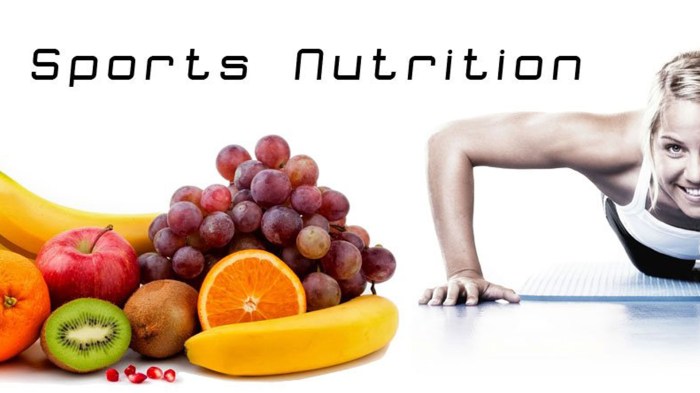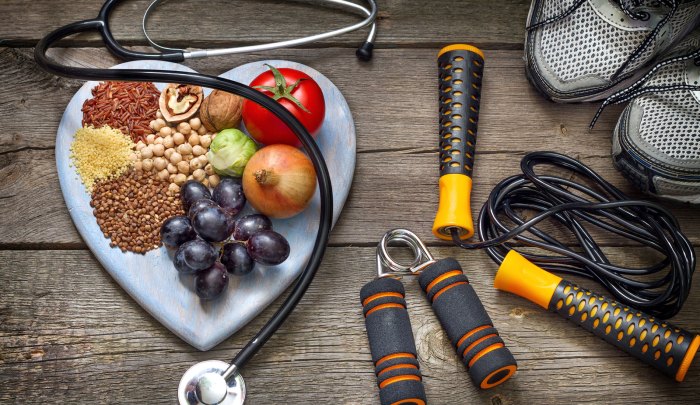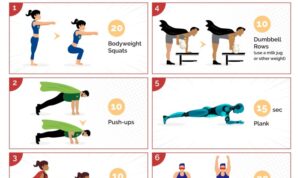Sports nutrition takes center stage in the world of athletes, unlocking the secrets to peak performance and unbeatable stamina. Get ready to dive into a world where nutrition meets athleticism in the most impactful way possible.
From the importance of macronutrients to the role of hydration, this topic covers everything you need to know to fuel your body like a true champion.
Benefits of Sports Nutrition
Proper nutrition is crucial for athletes as it directly impacts their performance, recovery, and overall health. By fueling their bodies with the right nutrients, athletes can optimize their physical abilities and achieve peak performance on the field or court.
Enhanced Performance
Nutrition plays a key role in enhancing athletic performance. Consuming the right balance of macronutrients, such as carbohydrates, proteins, and fats, provides the energy needed for intense workouts and competitions. Carbohydrates are the primary source of fuel for muscles, while proteins aid in muscle repair and growth. Fats contribute to long-lasting energy and support vital bodily functions.
Macronutrients and Micronutrients
Macronutrients are essential nutrients that athletes need in large quantities to maintain their energy levels and support muscle function. In addition to carbohydrates, proteins, and fats, athletes also require micronutrients like vitamins and minerals to ensure proper bodily functions, such as immune system support, bone health, and energy production.
Macronutrients in Sports Nutrition
Fueling your body with the right macronutrients is essential for athletic performance. Carbohydrates, proteins, and fats play a crucial role in providing energy, repairing muscles, and supporting overall health.
Carbohydrates
Carbohydrates are the body’s primary source of energy, especially during high-intensity workouts. Opt for complex carbohydrates like whole grains, fruits, and vegetables for sustained energy levels. Simple carbohydrates like sugary snacks can provide quick energy but may lead to a crash later on.
Proteins
Proteins are vital for muscle repair and growth. Lean sources of protein such as chicken, fish, tofu, and legumes are ideal for athletes. Aim to include protein in every meal to support muscle recovery and strength.
Fats
While often demonized, fats are important for overall health and energy storage. Healthy fats like avocados, nuts, and olive oil can provide a steady source of energy during endurance activities. Avoid trans fats and opt for unsaturated fats for optimal performance.
Optimal Ratios
The optimal ratio of macronutrients can vary based on the type of athletic activity. Endurance athletes may benefit from a higher carbohydrate intake, while strength athletes may require more protein. A general guideline is to aim for a diet consisting of 45-65% carbohydrates, 10-35% protein, and 20-35% fats.
Micronutrients and Hydration

Micronutrients and hydration play a crucial role in the health and performance of athletes. Let’s dive into the key micronutrients essential for athletes and the importance of proper hydration in sports nutrition.
Key Micronutrients for Athletes
- Vitamin D: Essential for bone health and immune function. Athletes often have higher vitamin D needs due to increased training loads and indoor training.
- Iron: Important for oxygen transport in the blood. Iron deficiency can lead to fatigue and decreased performance.
- Zinc: Supports immune function and helps with muscle repair and recovery.
- Magnesium: Involved in energy production and muscle function. Deficiency can lead to muscle cramps and impaired performance.
Importance of Hydration, Sports nutrition
Proper hydration is key for athletes to maintain performance and prevent dehydration. Dehydration can lead to decreased strength, endurance, and cognitive function. Athletes should aim to drink enough fluids before, during, and after exercise to stay hydrated.
Strategies for Electrolyte Balance
- Drink electrolyte-rich beverages during intense physical activity to replenish sodium, potassium, and other minerals lost through sweat.
- Include electrolyte-rich foods in your diet, such as bananas, sweet potatoes, and coconut water.
- Avoid overhydration, as this can lead to electrolyte imbalances. Listen to your body’s thirst cues and drink accordingly.
- Monitor sweat rate and adjust fluid intake based on individual needs and environmental conditions.
Pre-Workout and Post-Workout Nutrition
In sports nutrition, pre-workout and post-workout nutrition play a crucial role in optimizing performance, enhancing recovery, and supporting muscle growth.
Ideal Pre-Workout Meals/Snacks
Before a workout, it is essential to fuel your body with the right nutrients to maximize energy levels and performance. Ideal pre-workout meals/snacks should include a combination of carbohydrates for quick energy, protein for muscle support, and a small amount of healthy fats. Some examples of nutrient-dense pre-workout options include:
- Whole grain toast with almond butter and banana slices
- Greek yogurt with berries and a sprinkle of granola
- Oatmeal topped with nuts and a drizzle of honey
Significance of Post-Workout Nutrition
Post-workout nutrition is crucial for recovery and muscle building. Consuming the right nutrients after exercise can help replenish glycogen stores, repair muscle tissue, and promote muscle protein synthesis. Adequate protein intake is especially important post-workout to support muscle repair and growth. Some examples of nutrient-dense post-workout meals include:
- Grilled chicken breast with quinoa and roasted vegetables
- Salmon with sweet potato and steamed broccoli
- Veggie omelet with whole grain toast
Supplements in Sports Nutrition

Sports supplements play a crucial role in enhancing athletic performance by providing additional nutrients that may be lacking in an athlete’s diet. These supplements are designed to optimize energy levels, promote muscle growth, and improve overall physical endurance.
Common Supplements Used by Athletes
- Protein Powder: Helps in muscle repair and growth after intense workouts.
- Creatine: Increases muscle strength and power output during high-intensity exercises.
- BCAAs (Branched-Chain Amino Acids): Aid in muscle recovery and reduce muscle soreness.
- Omega-3 Fatty Acids: Reduce inflammation and support joint health.
Benefits of Supplements in Sports Nutrition
- Improved Recovery: Supplements can speed up muscle recovery after intense training sessions.
- Enhanced Performance: Certain supplements can boost energy levels and endurance during workouts.
- Muscle Growth: Protein supplements help in building and repairing muscle tissue for increased strength.
Importance of Consulting a Healthcare Provider
Taking supplements without proper guidance can have adverse effects on an athlete’s health. Consulting a healthcare provider before starting any supplement regimen is crucial to ensure that the supplements are safe and suitable for individual needs. It can also help in avoiding any potential interactions with existing medications or health conditions.
Eating Strategies for Endurance vs. Strength Athletes
When it comes to fueling their bodies, endurance athletes and strength athletes have unique nutritional requirements based on the demands of their respective sports. Endurance athletes, such as marathon runners or cyclists, need a high carbohydrate intake to sustain prolonged physical activity. On the other hand, strength athletes, like powerlifters or bodybuilders, require more protein to support muscle growth and recovery. Let’s delve into the specific eating strategies for each type of athlete.
Meal Planning Tips for Endurance Athletes
For endurance athletes, it is crucial to focus on consuming complex carbohydrates to provide sustained energy throughout their workouts and competitions. Include whole grains, fruits, vegetables, and legumes in your meals to ensure an adequate intake of carbs. Additionally, don’t forget to incorporate lean proteins and healthy fats to support overall performance and recovery. Meal timing is also essential for endurance athletes. Aim to consume a carbohydrate-rich meal or snack 1-2 hours before training or competing to top up glycogen stores. During prolonged exercise, consider consuming easily digestible carbohydrates like energy gels or sports drinks to maintain energy levels.
Meal Planning Tips for Strength Athletes
Strength athletes need to prioritize protein intake to support muscle repair and growth. Include lean sources of protein such as chicken, turkey, fish, eggs, and plant-based protein options in your meals. Carbohydrates are also important for strength athletes, especially around their workout times to fuel intense training sessions. Incorporate complex carbs like sweet potatoes, brown rice, and quinoa into your pre and post-workout meals. Healthy fats from sources like avocados, nuts, and seeds can aid in hormone regulation and overall well-being for strength athletes.
Timing of Meals and Snacks
Both endurance and strength athletes should pay attention to the timing of their meals and snacks based on their training schedules and competition times. Aim to eat a well-balanced meal 2-3 hours before training to ensure proper digestion and energy availability. Post-workout nutrition is crucial for both types of athletes to support recovery. Within 30 minutes to an hour after training, consume a combination of protein and carbohydrates to replenish glycogen stores and kickstart muscle repair. Snacks can be beneficial for maintaining energy levels throughout the day, especially for endurance athletes who have multiple training sessions or competitions in a single day.

